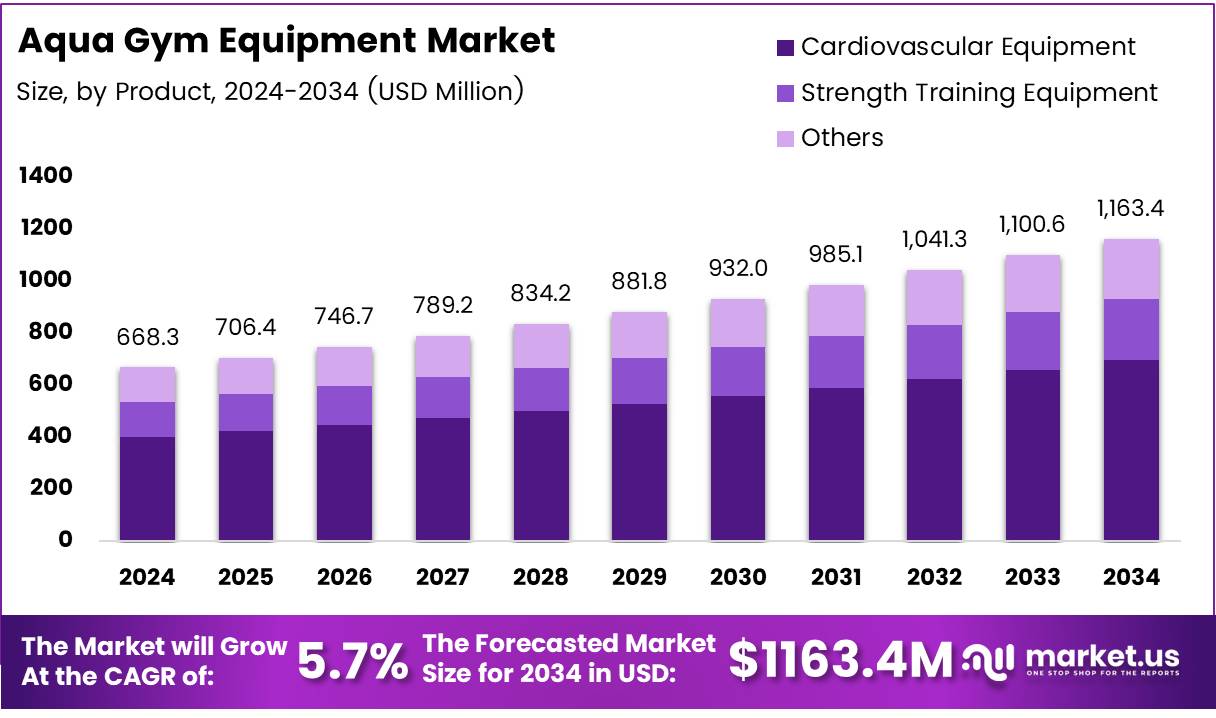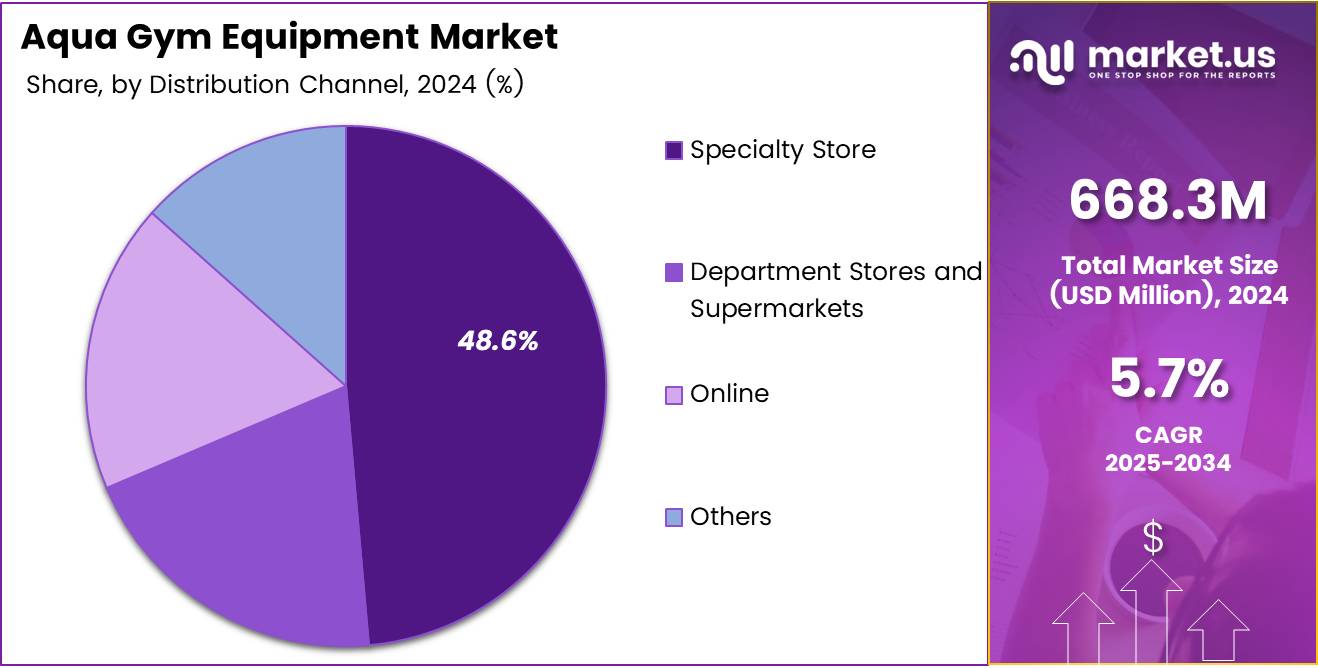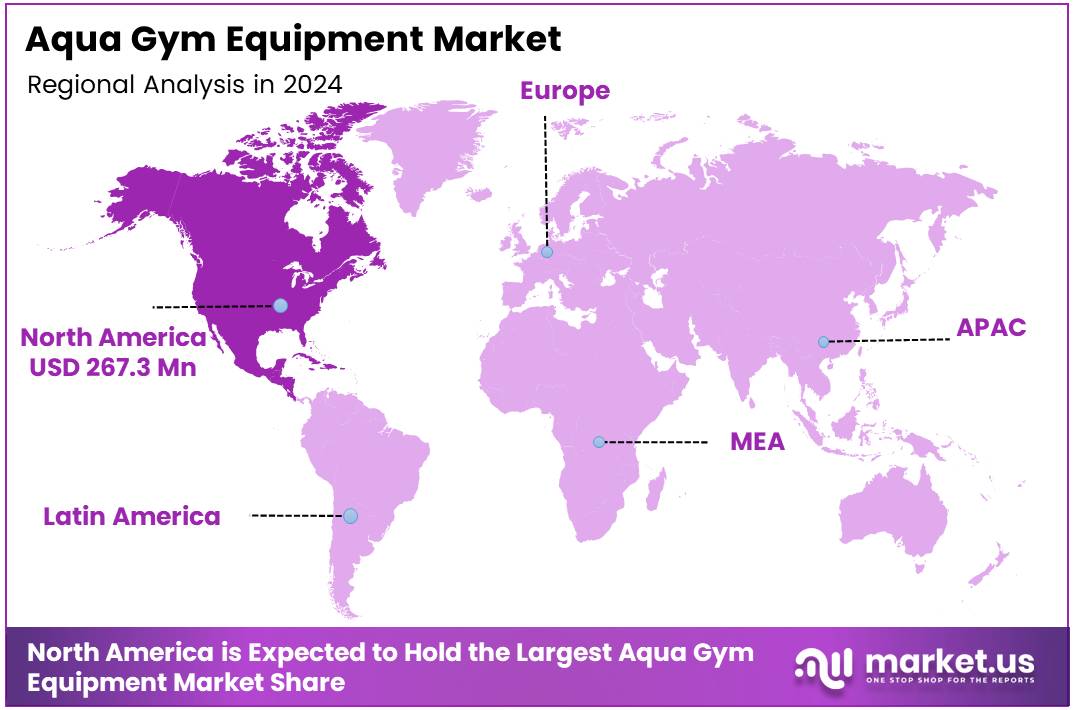Global Aqua Gym Equipment Market Size, Share, Growth Analysis By Product (Cardiovascular Equipment, Strength Training Equipment, Others), By Distribution Channel (Specialty Store, Department Stores and Supermarkets, Online, Others) , By Region and Companies - Industry Segment Outlook, Market Assessment, Competition Scenario, Statistics, Trends and Forecast 2025-2034
- Published date: April 2025
- Report ID: 147747
- Number of Pages: 239
- Format:
-
keyboard_arrow_up
Quick Navigation
Report Overview
The Global Aqua Gym Equipment Market size is expected to be worth around USD 1163.4 Million by 2034, from USD 668.3 Million in 2024, growing at a CAGR of 5.7% during the forecast period from 2025 to 2034.
The Aqua Gym Equipment Market includes tools and accessories specifically designed for water-based fitness, rehabilitation, and therapeutic activities. These products range from resistance weights and floating dumbbells to underwater treadmills and aquatic cycles. They are primarily used in pools for improving strength, flexibility, balance, and cardiovascular health. This segment is growing rapidly due to its appeal among seniors, rehabilitation patients, and fitness enthusiasts looking for low-impact workout solutions.

Aqua gym equipment plays a vital role in accessible and joint-friendly workouts. Water offers natural resistance, making movements safer and more effective, especially for the elderly and individuals with limited mobility. According to ScienceDirect, standing in water at the xiphoid level can reduce the apparent body weight of obese individuals by 80%, offering a powerful alternative to traditional workouts.
Unlike conventional gyms, aqua workouts significantly reduce the risk of injuries. This makes them ideal for post-operative therapy and arthritis management. With increasing awareness, gyms and rehabilitation centers are integrating aqua gym gear into their service offerings. Moreover, as per Everyone Active, individuals can burn 400–500 calories in a typical aqua fitness session, boosting its popularity among weight-conscious consumers.
Growing urban wellness trends and an aging global population are major drivers. Countries with high life expectancy, such as Japan and several European nations, are showing strong demand for these solutions. Aqua gym equipment is also becoming popular in wellness resorts and luxury hotels, further expanding its user base.
The aqua gym equipment market is witnessing strong growth, supported by healthcare integration and fitness diversification. Rising chronic diseases and obesity levels are pushing consumers toward gentler but effective exercise routines. Water workouts meet this need without stressing joints or risking injury, making this equipment increasingly essential.
Governments are beginning to promote aquatic therapy through public health programs. In regions like Europe and Australia, subsidies for hydrotherapy are encouraging wider adoption. Investment in community aquatic centers is rising, supported by healthcare agencies focusing on preventive care and rehabilitation.
Regulations now emphasize product safety and material durability, particularly in public or commercial pools. Equipment made of anti-bacterial, corrosion-resistant materials is gaining traction. Manufacturers that comply with eco-friendly and safety norms are more likely to secure contracts with hospitals and sports complexes.
Future opportunities lie in the development of smart aquatic equipment. Integration of IoT, underwater sensors, and digital performance tracking will reshape how users engage with water workouts. As health-conscious lifestyles evolve, demand for personalized, tech-driven aqua fitness will drive innovation and differentiation in the market.
Key Takeaways
- Global Aqua Gym Equipment Market is projected to reach USD 1,163.4 Million by 2034, up from USD 668.3 Million in 2024.
- The market is expected to expand at a CAGR of 5.7% from 2025 to 2034.
- Cardiovascular Equipment led the product segment in 2024 with a 60.1% market share, driven by demand for low-impact aquatic workouts.
- Specialty Stores dominated distribution channels in 2024, holding a 48.6% share due to personalized service and expert guidance.
- North America held the largest regional share in 2024 at 40.5%, valued at USD 267.3 Million, supported by high health awareness and advanced fitness infrastructure.
Product Analysis
Cardiovascular Equipment leads with 60.1% driven by high adoption in water-based fitness regimes.
In 2024, Cardiovascular Equipment held a dominant market position in the By Product Analysis segment of the Aqua Gym Equipment Market. This segment accounted for a significant 60.1% of the total market, reflecting its widespread usage in low-impact aquatic workouts. The demand is fueled by growing awareness around heart health and the rising preference for joint-friendly exercise options among aging populations.
Strength Training Equipment followed as the next major contributor, catering to users seeking resistance-based aquatic training. This category benefits from increased consumer interest in muscle strengthening and toning exercises without the strain typically associated with land-based workouts. While not as dominant, it continues to gain traction in rehabilitation centers and boutique fitness studios.
The Others segment, comprising equipment like balance trainers and flexibility-enhancing tools, holds a niche but growing share. These products appeal to specialized demographics such as athletes recovering from injury or seniors engaging in functional fitness routines. Although currently limited in scale, innovation in this segment could pave the way for future growth.
Overall, the Aqua Gym Equipment Market remains heavily influenced by cardiovascular applications, underscoring the importance of water-based cardio fitness in modern health and wellness trends.
Distribution Channel Analysis
Specialty Store dominates with 48.6% due to personalized service and product variety.
In 2024, Specialty Store held a dominant market position in the By Distribution Channel Analysis segment of the Aqua Gym Equipment Market. This channel captured a significant 48.6% share, driven by its ability to offer expert advice, customized product recommendations, and hands-on demonstrations. Consumers seeking premium and professional-grade aqua fitness equipment continue to prefer specialty outlets for their reliability and tailored services.
Department Stores and Supermarkets also play a key role in the market, offering accessibility and convenience. These retail formats cater mainly to casual or first-time buyers looking for basic water workout gear, benefiting from impulse purchases and broader reach within urban and suburban areas.
Online channels have seen rapid growth, especially among tech-savvy consumers. While online sales are still catching up in terms of volume, digital platforms offer the advantage of a wide product range and competitive pricing. Additionally, evolving e-commerce logistics and return policies are reducing buyer hesitation.
The Others category, including fitness clubs and water parks, contributes a minor share but is important in promoting awareness and usage. These channels serve more as touchpoints for experiential marketing rather than primary sales platforms.

Key Market Segments
By Product
- Cardiovascular Equipment
- Strength Training Equipment
- Others
By Distribution Channel
- Specialty Store
- Department Stores and Supermarkets
- Online
- Others
Drivers
Increasing Health Consciousness Drives Market Demand for Aqua Gym Equipment
Growing awareness about health and fitness, especially after the COVID-19 pandemic, has significantly increased interest in innovative workout options. People are now more focused on maintaining overall wellness, which has led to rising demand for aqua gym equipment. These water-based tools offer a unique combination of effective workouts and reduced risk of injury, making them attractive for a broader audience.
One of the main reasons behind this trend is the rising popularity of water-based exercises. Such exercises are gentle on the joints while still being effective for strength and cardio training. This makes aqua fitness suitable for elderly individuals, people recovering from injuries, and even athletes looking for recovery routines. As a result, aqua gym equipment is becoming more common in fitness centers and rehabilitation facilities.
In addition, technological advancements are playing a key role in market growth. Newer aqua gym equipment is being developed with user-friendly, ergonomic designs and materials that can withstand constant exposure to water. These innovations are improving the durability, efficiency, and overall appeal of the products, encouraging wider adoption across different consumer segments. With the rising interest in health-conscious lifestyles, the demand for safe, effective, and innovative workout tools like aqua gym equipment is expected to continue growing.
Restraints
High Initial Investment Restrains Market Expansion for Aqua Gym Equipment
One of the biggest challenges facing the aqua gym equipment market is the high cost of setting up such facilities. Specialized equipment designed for underwater use can be expensive, and this initial investment is often too much for small gyms, wellness studios, or individuals looking to build a home gym. This cost barrier limits market penetration, especially in emerging regions or among budget-conscious consumers.
Another concern is the ongoing maintenance required for aqua gym equipment. Since these tools are constantly exposed to water and chlorine, they tend to wear out faster than standard gym equipment. Regular upkeep and part replacements are necessary to keep the machines functioning properly and safely. This adds to the long-term operational costs, making aqua gym equipment a less attractive investment for some buyers.
For fitness centers and recreational facilities, balancing these maintenance costs with the return on investment can be difficult. Many operators may choose to delay or avoid adopting aqua gym equipment altogether, despite its benefits. These financial hurdles need to be addressed through cost-effective solutions or support services to unlock broader market potential.
Growth Factors
Growing Senior Population Opens New Opportunities in Aqua Gym Equipment Market
The increasing number of senior citizens globally is creating new growth avenues for the aqua gym equipment market. Older adults often prefer low-impact exercise options to stay fit without putting stress on their joints. Aqua gym equipment is ideal in this context, offering safe, effective workouts for improving mobility, strength, and cardiovascular health. As more seniors seek tailored fitness solutions, there is a clear opportunity for manufacturers to design specialized equipment that meets their needs.
In parallel, there’s rising interest in home-based fitness, especially after the pandemic made consumers more inclined to work out at home. Compact, affordable aqua gym solutions that fit in home pools or portable systems are gaining traction. Brands that innovate in this space can tap into a growing segment of fitness enthusiasts who want the benefits of water workouts without visiting a facility.
Furthermore, gyms and wellness centers are expanding their aquatic fitness programs to attract more members. These programs often require a variety of specialized equipment, such as underwater treadmills, resistance tools, and flotation devices. This trend offers manufacturers a chance to diversify and grow their product lines while partnering with commercial facilities for long-term growth.
Emerging Trends
Integration with Wearable Technology Shapes Trends in Aqua Gym Equipment
The trend of integrating wearable fitness technology with aqua gym equipment is becoming more widespread. Devices like waterproof fitness trackers and smartwatches are now being paired with aquatic workout tools to monitor performance, heart rate, and calorie burn in real time. This tech-enhanced experience helps users track progress and stay motivated, making workouts more engaging and data-driven.
Another important trend is the focus on sustainability. As environmental concerns grow, manufacturers are shifting toward using eco-friendly materials and water-efficient technologies in their equipment designs. From recycled plastics to energy-saving systems, these innovations not only reduce environmental impact but also appeal to eco-conscious consumers and organizations looking to meet green standards.
Personalization is also becoming a key factor. Fitness programs tailored to individual goals and body types are in demand, and this extends to aqua fitness. Users now expect equipment that supports customized resistance levels, adjustable features, and integration with personalized training plans. This trend is driving the development of more adaptable, user-focused aqua gym tools, further boosting market potential.
Regional Analysis
North America Dominates the Aqua Gym Equipment Market with a Market Share of 40.5%, Valued at USD 267.3 Million
North America leads the global aqua gym equipment market, driven by rising health awareness, growing adoption of aquatic fitness programs, and well-established fitness infrastructure. The region’s high disposable income and increasing inclination toward low-impact fitness solutions further contribute to its dominance. Demand is particularly strong across urban centers where health and wellness trends are shaping consumer behavior.

Regional Mentions:
Europe follows as a significant regional market, supported by widespread adoption of water-based rehabilitation and fitness programs. The region benefits from an aging population that prefers low-impact exercises, along with public initiatives promoting physical well-being through innovative fitness alternatives.
The Asia Pacific region is experiencing rapid growth in the aqua gym equipment market due to increasing urbanization, expanding middle-class population, and growing health consciousness. Countries like China, Japan, and Australia are witnessing a surge in fitness club memberships and recreational swimming facilities, fueling market demand.
In the Middle East & Africa, the market is gradually gaining traction, particularly in the Gulf countries, where premium fitness and wellness facilities are on the rise. Rising awareness of water-based exercise benefits and increasing investments in health infrastructure are expected to support market development.
Latin America shows steady progress in the aqua gym equipment market, with growing interest in fitness and lifestyle enhancement. Brazil and Mexico are notable contributors, as the regional population becomes more proactive about health and wellness, encouraging adoption of alternative fitness modalities like aquatic workouts.
Key Regions and Countries
- North America
- US
- Canada
- Europe
- Germany
- France
- The UK
- Spain
- Italy
- Rest of Europe
- Asia Pacific
- China
- Japan
- South Korea
- India
- Australia
- Rest of APAC
- Latin America
- Brazil
- Mexico
- Rest of Latin America
- Middle East & Africa
- South Africa
- Saudi Arabia
- UAE
- Rest of MEA
Key Players Analysis
In 2024, the global Aqua Gym Equipment Market continues to experience moderate growth, driven by a rising emphasis on low-impact fitness and rehabilitation solutions. BECO-Beermann GmbH & Co. KG maintains a strong position due to its wide-ranging product portfolio and established European market presence. Its strategic partnerships and consistent innovation in aquatic fitness gear support its competitive edge.
Sprint Aquatics focuses on versatility and accessibility, offering a broad array of aquatic fitness products catering to both therapeutic and fitness applications. Its customer-centric approach and affordability make it a preferred choice among institutional buyers.
HydroWorx International, Inc. stands out for its specialization in hydrotherapy solutions and advanced aquatic treadmills, targeting rehabilitation centers and professional sports teams. The brand’s strong emphasis on clinical results and technological integration enhances its credibility in the medical segment.
HYDRO-FIT, Inc. capitalizes on decades of expertise in aquatic exercise equipment, especially resistance gear and training accessories. Its commitment to quality and educational support for instructors has helped it retain loyal users in the North American market.
Together, these players continue to shape the evolving landscape of aquatic fitness by focusing on user-specific needs, from rehabilitation to performance training.
Top Key Players in the Market
- BECO-Beermann GmbH & Co. KG
- Sprint Aquatics
- HydroWorx International, Inc.
- HYDRO-FIT, Inc.
- Acquapole S.a.s.
- AquaJogger
- PlayCore, Inc.
- Be Aqua Pte. Ltd.
- TEXAS REC
Recent Developments
- In Nov 2024, a Bristol-based startup secured £500k in funding to develop what it claims is the world’s first aqua rehabilitation technology, aimed at transforming recovery therapy. The investment will support product development, clinical validation, and commercial rollout across the UK.
- In Jan 2024, PROMOUNTINGS® announced the acquisition of AQUA TRAINING BAG®, a brand known for its water-filled punching bags. The move aims to strengthen PROMOUNTINGS®’ presence in the combat fitness and training equipment market.
- In Feb 2025, Waterland Private Equity partnered with WellNess to drive the expansion of France’s top premium fitness club chain. The collaboration is expected to enhance WellNess’s innovation, digitalization, and international growth strategy.
Report Scope
Report Features Description Market Value (2024) USD 668.3 Million Forecast Revenue (2034) USD 1163.4 Million CAGR (2025-2034) 5.7% Base Year for Estimation 2024 Historic Period 2020-2023 Forecast Period 2025-2034 Report Coverage Revenue Forecast, Market Dynamics, Competitive Landscape, Recent Developments Segments Covered By Product (Cardiovascular Equipment, Strength Training Equipment, Others), By Distribution Channel (Specialty Store, Department Stores and Supermarkets, Online, Others) Regional Analysis North America – US, Canada; Europe – Germany, France, The UK, Spain, Italy, Rest of Europe; Asia Pacific – China, Japan, South Korea, India, Australia, Singapore, Rest of APAC; Latin America – Brazil, Mexico, Rest of Latin America; Middle East & Africa – South Africa, Saudi Arabia, UAE, Rest of MEA Competitive Landscape BECO-Beermann GmbH & Co. KG, Sprint Aquatics, HydroWorx International, Inc., HYDRO-FIT, Inc., Acquapole S.a.s., AquaJogger, PlayCore, Inc., Be Aqua Pte. Ltd., TEXAS REC Customization Scope Customization for segments, region/country-level will be provided. Moreover, additional customization can be done based on the requirements. Purchase Options We have three licenses to opt for: Single User License, Multi-User License (Up to 5 Users), Corporate Use License (Unlimited User and Printable PDF)  Aqua Gym Equipment MarketPublished date: April 2025add_shopping_cartBuy Now get_appDownload Sample
Aqua Gym Equipment MarketPublished date: April 2025add_shopping_cartBuy Now get_appDownload Sample -
-
- BECO-Beermann GmbH & Co. KG
- Sprint Aquatics
- HydroWorx International, Inc.
- HYDRO-FIT, Inc.
- Acquapole S.a.s.
- AquaJogger
- PlayCore, Inc.
- Be Aqua Pte. Ltd.
- TEXAS REC









